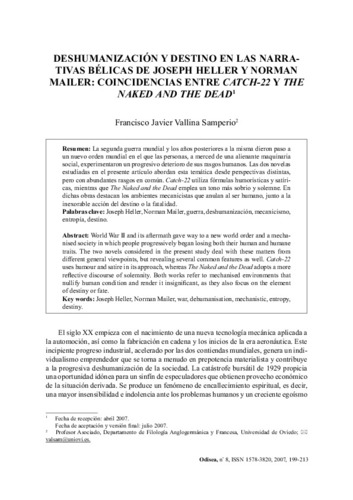Deshumanización y destino en las narrativas bélicas de Joseph Heller y Norman Mailer: coincidencias entre "Catch-22" y "The Naked and the Dead"
Autor(es) y otros:
Fecha de publicación:
Editorial:
Universidad de Almería
Citación:
Descripción física:
Resumen:
Resumen: La segunda guerra mundial y los años posteriores a la misma dieron paso a un nuevo orden mundial en el que las personas, a merced de una alienante maquinaria social, experimentaron un progresivo deterioro de sus rasgos humanos. Las dos novelas estudiadas en el presente artículo abordan esta temática desde perspectivas distintas, pero con abundantes rasgos en común. Catch-22 utiliza fórmulas humorísticas y satíri- cas, mientras que The Naked and the Dead emplea un tono más sobrio y solemne. En dichas obras destacan los ambientes mecanicistas que anulan al ser humano, junto a la inexorable acción del destino o la fatalidad.----Abstract: World War II and its aftermath gave way to a new world order and a mecha- nised society in which people progressively began losing both their human and humane traits. The two novels considered in the present study deal with these matters from different general viewpoints, but revealing several common features as well. Catch-22 uses humour and satire in its approach, whereas The Naked and the Dead adopts a more refl ective discourse of solemnity. Both works refer to mechanised environments that nullify human condition and render it insignifi cant, as they also focus on the element of destiny or fate
Resumen: La segunda guerra mundial y los años posteriores a la misma dieron paso a un nuevo orden mundial en el que las personas, a merced de una alienante maquinaria social, experimentaron un progresivo deterioro de sus rasgos humanos. Las dos novelas estudiadas en el presente artículo abordan esta temática desde perspectivas distintas, pero con abundantes rasgos en común. Catch-22 utiliza fórmulas humorísticas y satíri- cas, mientras que The Naked and the Dead emplea un tono más sobrio y solemne. En dichas obras destacan los ambientes mecanicistas que anulan al ser humano, junto a la inexorable acción del destino o la fatalidad.----Abstract: World War II and its aftermath gave way to a new world order and a mecha- nised society in which people progressively began losing both their human and humane traits. The two novels considered in the present study deal with these matters from different general viewpoints, but revealing several common features as well. Catch-22 uses humour and satire in its approach, whereas The Naked and the Dead adopts a more refl ective discourse of solemnity. Both works refer to mechanised environments that nullify human condition and render it insignifi cant, as they also focus on the element of destiny or fate
ISSN:
Colecciones
- Artículos [37532]
- Filología Inglesa, Francesa y Alemana [582]
Ficheros en el ítem




